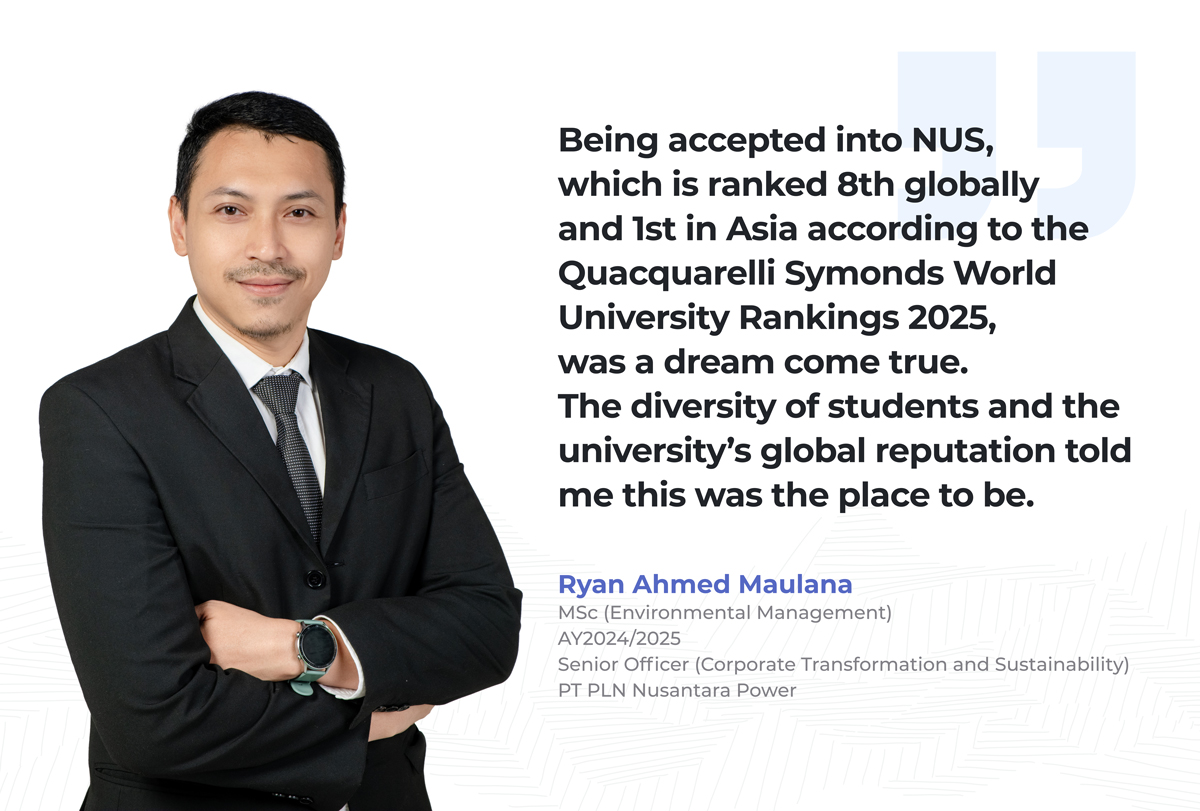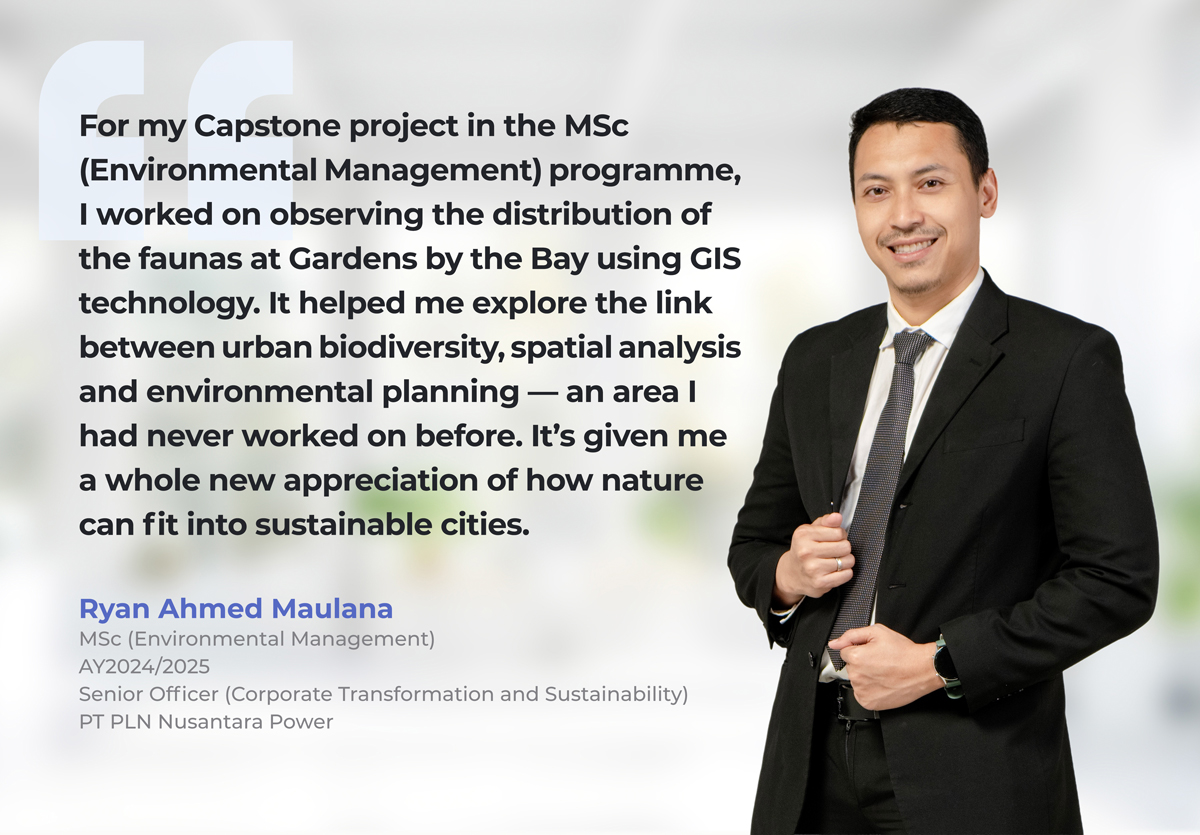Ryan Ahmed Maulana always believed that sustainability was not simply about carbon but about people.
As a team leader at PT Perusahaan Listrik Negara (PT PLN (Persero), Indonesia’s state-owned electricity company, Ryan has seen how clean energy projects can transform lives, especially in remote communities. However, to drive real change, he knew he needed something more a deeper, broader and more connected understanding of environmental management.
This desire for in-depth expertise brought him to Singapore and a Master of Science programme at the National University of Singapore (NUS). In these halls, he is connecting with a global community that is expanding his view of what is possible and how real impact is made.
From Day-to-Day Operations to Long-Term Change
Ryan’s career at PT PLN (Persero) began nearly a decade ago. He has worked in various roles from corporate social responsibility (CSR) to stakeholder engagement and general affairs each position gradually bringing him closer to the front lines of Indonesia’s energy and environmental challenges.
Despite his growing experience, Ryan felt a need to better understand the sustainability issues embedded in his work, especially as Indonesia ramps up its clean energy efforts. “I was already involved in areas like clean product campaigns and CSR programmes,” Ryan shares. “However, I knew that to truly support Indonesia’s renewable energy goals, I needed a stronger foundation in environmental management.”
That conviction led him to the NUS Master of Science (Environmental Management) (MEM) programme an internationally recognised multidisciplinary programme that aligns nicely with his goals.
Making NUS His First Choice
Ryan shared the thought process behind his decision to enrol at NUS candidly. “Being accepted into NUS, which is ranked 8th globally and 1st in Asia*, was a dream come true. The diversity of students and the university’s global reputation told me this was the place to be.”
He is also grateful to the Asian Development Bank-Japan Scholarship Programme (ADB-JSP), which made his path to NUS possible. He explains: “Coming from a developing country, this scholarship has been life-changing. It’s given me access to a world-class education, a global network and a knowledge base that I can bring home after I graduate.”
A Global Learning Community
As an international student, being immersed in a global network has been one of the highlights of Ryan’s time at NUS.
“I’m constantly inspired by the diversity of students here,” he says, relating stories about how peers from China shared their fascinating perspectives on clean technology and green infrastructure, and how students from Europe have helped him gain insights into sustainability governance and practices.”

As one of the few Southeast Asian students from outside Singapore in the programme, Ryan contributed his share of fresh perspectives too — giving his classmates insights into clean energy development, community engagement and the unique challenges faced by developing countries such as Indonesia.
Learning Across Disciplines and Perspectives
Ryan explains that what set the MEM programme apart is its deliberate integration of disciplines, which has been especially useful for someone with a non-technical background.
He adds: “It’s been beyond my expectations. I’ve gained a multidisciplinary perspective on the latest sustainability issues across economics, social science, governance, technology, ecology and law — as well as an understanding of how it is all connected.”
Elaborating, he shares how courses like Environmental and Sustainability Management – Law, Governance and Practice gave him new insights into the legal structures driving environmental accountability. Meanwhile, Well & Green Built Environment opened his eyes to the power of design in reducing emissions and improving quality of life, which is especially critical in emerging economies where regulation is still developing.
Ryan also deepened his understanding of corporate strategy and inclusive development through his Sustainability Strategy and Business and Sustainable Development classes, explaining: “These helped me see how companies can approach sustainability not just as a responsibility but as a value proposition. I also gained insights into stakeholder dynamics, social impact assessments and creating inclusive and resilient business operations.”
Real-World Projects, Real-World Relevance
When asked about standout moments from the programme, Ryan points to a field-based study at Singapore’s Gardens by the Bay — a project that transformed classroom concepts into real-world applications.
“For my Capstone project, I worked on observing the distribution of one of the faunas at Gardens by the Bay using Geographic Information System (GIS) technology,” Ryan recalls. “It helped me explore the link between urban biodiversity, spatial analysis and environmental planning — an area I had never worked on before. It’s given me a whole new appreciation of how nature can fit into sustainable cities.”

A Purpose That Has Never Left Him
After learning so much about Ryan’s journey in NUS, we had to ask him where his passion for sustainability began.
We learned that back in 2017, Ryan was volunteering on a micro-hydro project in Papua as part of the Enlightening Indonesia programme. The experience left a lasting mark — teaching him the importance of balancing technical solutions with environmental and social sensitivity, and deepening his commitment to clean energy development, especially in remote areas.
That early spark continues to fuel him today. After graduating, Ryan will return to PT PLN (Persero) with renewed energy and ready to apply his skillset from his MEM studies, skills in Environmental Law and the Environmental, Social, and Governance fields to name a few.
Looking Ahead: Energy, Equity and Impact
Ryan’s long-term aspiration is to help shape Indonesia’s national energy and sustainability policies — not just at a technical level, but through inclusive, community-focused approaches.
“One of my aspirations is to help shape Indonesia’s energy and sustainability policies,” he says. “However, before we go deeply into building clean energy development, I also want to contribute more broadly to Indonesia’s development, particularly in addressing foundational issues like poverty, education, and food security, through supporting cross-sectoral initiatives that promote sustainable development goals”
By bridging environmental priorities with social impact, and technical strategies with community insight, Ryan is working toward a future where progress is both green and grounded — a tomorrow that uplifts people, protects the planet and moves his home country of Indonesia forward as a unified whole.
*According to the Quacquarelli Symonds World University Rankings 2025